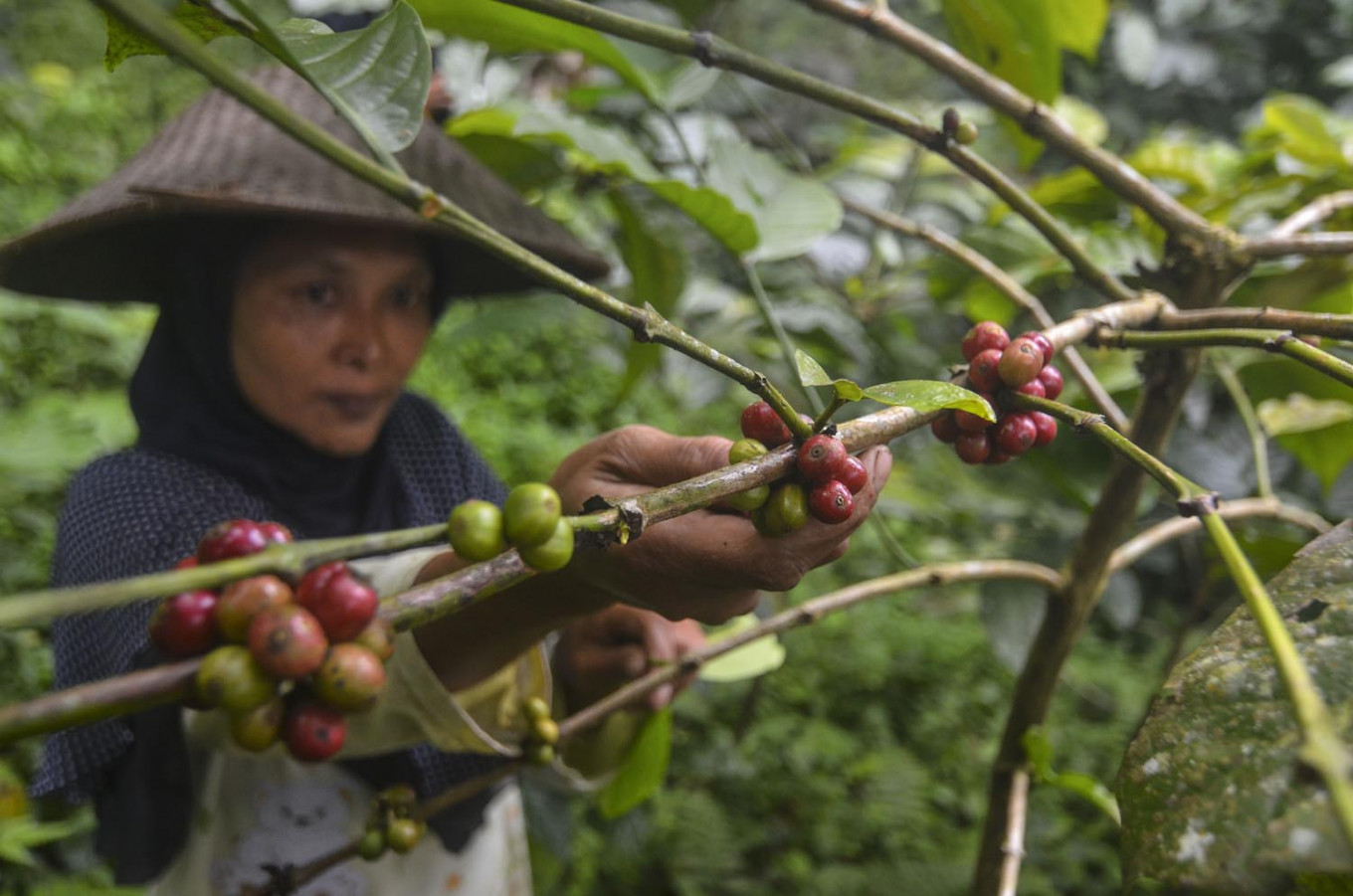Popular Reads
Top Results
Can't find what you're looking for?
View all search resultsPopular Reads
Top Results
Can't find what you're looking for?
View all search resultsGlobal arabica coffee price hike not helping farmers as pandemic slumps local demand
Global arabica coffee prices rose 16 percent year-on-year to US$3.63 per kilogram in the first quarter of 2021, continuing a longer-term uptrend, but Indonesian coffee farmers have seen no better future.
Change text size
Gift Premium Articles
to Anyone
G
lobal arabica coffee prices rose 16 percent year-on-year (yoy) to US$3.63 per kilogram in the first quarter of 2021, continuing a longer-term uptrend, according to World Bank data, but Indonesian coffee farmers have seen no increase in income.
Data from the Trade Ministry’s Commodity Futures Trading Regulatory Agency (Bappebti) shows that the domestic arabica coffee price, set by the Indonesian Coffee Exporters Association (AEKI), dropped by 40 percent from Rp 60,000 to Rp 36,000 per kilogram from April 1, 2020, to April 1, 2021. It has recovered somewhat from that level, settling at Rp 52,000 per kg on Friday.
“The decrease in the [domestic] arabica coffee price [over the past year] is due to a lack of demand from [consumption] places, such as cafes, because the pandemic restrictions have significantly reduced the number of visitors at such places,” AEKI secretary Miftahul Kirom told The Jakarta Post in an email on Wednesday.
The robusta coffee price, meanwhile, has been more stable. The commodity changed hands at Rp 27,000 per kg on Wednesday after an increase since March.
Miftahul attributed the robusta coffee price stability to the fact that the variety is mostly used for prepackaged products, like coffee sachets, which have been impacted less by the pandemic.
Read also: Indonesia’s coffee: More than just a cuppa
Puspitaningasih Sutrisno from West Java coffee grower and processor Kebun Aku told the Post on Monday that the pandemic was partly to blame for the ongoing decrease in the coffee price in her area.
Puspitaningasih added that, for small and medium-sized coffee processors, the sharp decrease in domestic demand for green beans, or unroasted beans, had caused the decline in the commodity’s price. She said any green beans processing businesses could not sell to domestic end users in processed form had to be sold in unprocessed form to exporters, who offered only low prices.
Fikry Pratama, a coffee farmer from West Java, told the Post on Monday that, because of reduced demand in the pandemic, many farmers were stockpiling green beans. Beans held in that state can be sold and processed at a later time.
So far, the production of coffee cherries and fresh beans was not negatively impacted by the pandemic, Puspitaningasih explained.
Toxic price competition among processors was common, she also noted, as producers found themselves forced into a race to the bottom.
Read also: Little evidence coffee companies' sustainability efforts have impact: Report
A recent study on farming practices conducted by World Agroforestry (ICRAF) in North Sumatra’s Pagar Alam regency found that the adoption of gender-inclusive agroforestry practices could improve efficiency in coffee production and in turn increase household income for farming families.
According to data from the Agriculture Ministry’s Plantation Directorate General, Indonesia only achieved an average coffee yield of 782 kg per hectare in 2019, just over a third of a potential yield of 2082 kg per ha.
Statistics Indonesia (BPS) data show that Indonesia exported 379,354 tons of coffee with a total value of US$821 million in 2020, down 7 percent from the preceding year. Indonesia exported coffee at an average price of $2,167 per ton.










